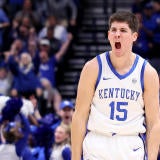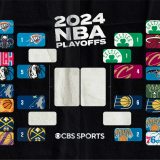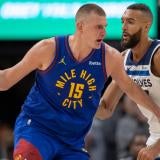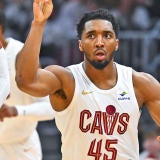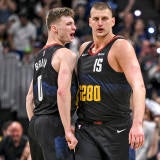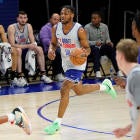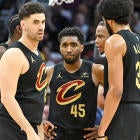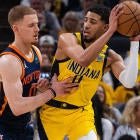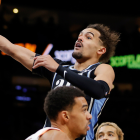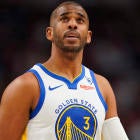SALT LAKE CITY -- Los Angeles Lakers' legend Kobe Bryant has had a memorable career in many arenas, but what used to be the Delta Center and is now Vivint Smart Home Arena in Salt Lake City has been one of the more transformative arenas for Kobe's career. It was in this arena that Bryant first experienced failure under a spotlight his rookie season when he air balled several key shots against the Utah Jazz in the 1997 playoffs.
The Jazz defeated Kobe in the playoffs in his first two seasons in the NBA, once in the second-round and once in the Western Conference finals. Since then, Bryant has won five championships, two Finals MVP awards, and a regular season MVP. He's also led the Lakers to playoff victories over the Jazz in 2008, 2009, and 2010.
As he plays his second-to-last game in Salt Lake City against the Jazz, he held a special pre-game press conference with the media Saturday night. He addressed many things from the decision he made to retire to not wanting to play in the Olympics in 2016 to what his body and mind still go through. Here is the transcript of his press conference:
Q: When you come into this building, what are some of the thoughts that come into your mind?
Kobe: There’s a lot of them. I remember the air balls in ’98. I remember having a team only meeting on the bus. I think that was ’98 as well. Van Exel, Eddie Jones, and everybody staying on the bus and having a team meeting. Obviously the playoff series with [Deron Williams], [Carlos Boozer], and that whole crew. There’s a lot of great memories.
Q: When you go back and look at this, does a finality hit you and if it has, did it hit you gradually or was it more where you went, ‘Wow, this is the final go-round’?
Kobe: It’s kind of coming. It’s weird because I’m waiting for it to really hit me. You know what I mean? Waiting for it to really hit heavy. Right now I feel really good. It’s been smooth. Part of me is saying it can’t be that smooth, you know what I mean? I’m walking away from the game I’ve been playing since I was two years old. At some point it’s got to just hit like a ton of brick. I’m kind of on pins and needles to see if that’ll happen.
Q: Is there a moment in this process where you remember the mind still working and the body not following the mind as well you’d want it to?
Kobe: Yeah, last game. It’s strange. If I could describe it, it’s like when you don’t have the energy in the legs that you used to have. It’s the energy in the legs. It’s the explosiveness. It’s the continual motor. Those things are always taken for granted. I could run at a high speed and play hard for an entire game. Now I can run all day from a stamina perspective but the legs don’t have the same amount of energy, so you find the habit of trying to figure other things out. That’s the feeling.
Q: Kobe, what were the swing of emotions like for you where the first years in the league you can’t be Utah and then earlier this decade, you got them three times in a row?
Kobe: It was a great feeling to have that happen. After that series, I was very miserable. Every day I thought about it. Thought about trying to get past these guys. It was the 99-00 season we played them at the Staples Center and that was like, ‘OK we can really beat these guys.’ We blew them out, I think it was by 40 points, and that’s when we realized we can get past these guys.
Q: We talked about the air ball that kind of helped shaped you but what do you remember about the next time you got to play them? Six months later, 19 years old. The two free throws. Blocking [Bryon] Russell’s 3-pointer and going down for the slam dunk.
Kobe: Vindication even though I don’t think Russell and the Jazz… I don’t think they could really care less because it was a regular season game with the experience they had. But to me it was a really, really big moment; it was a really, really big deal. And it kind of proved to me that hard work and the work you do in the offseason is going to pay dividends for you in-season.
Q: Lot of memories with the Jazz team. Do you have any memories with this Jazz crowd here in this arena?
Kobe: [Laughing] Yeah, a little bit. Yeah. Yeah. They were really, really tough on me, man. More so than the other crowds. They were tough. Signs when I’m shooting a free throw to literally just yelling it in my ear. Taking the ball out. They pissed me off so much. It was like ’08 in the playoffs where I just kind of erupted after a play, talking back to the crowd because they just kept driving me. With that said, it’s fond memories truly because it was like that’s what sports should be. That kind of bantering and that kind of competition or whatever. I’ve always loved playing here because of that.
Q: A man that is so driven like yourself, if you can, as you think about life after basketball, have you thought about ownership, coaching, broadcasting? Have you had a chance to just let it soak in and say what about life – because you’re still a young man – but after basketball that will keep you motivated and focused?
Kobe: Yeah, those are tough questions for athletes, I think. I’ve been kind of searching for what that was going to be for years now – 15 or 16 years – kind have been searching for that next passion and I’ve been very fortunate enough to find it to the point where it keeps me up at night. Constantly working, studying, and trying to get better at it, and I’m really looking forward to moving into that next phase. Ownership is in terms of being there day-to-day or coaching and things of that sort don’t interest me. I just don’t have a passion for it. Or broadcasting for that matter, I just don’t have a passion for it.
Q: Speaking of the future, the other day you said it was Draymond’s and Steph’s time to pursue championships and gold medals. That you’ve had your turn. Have you closed the door on pursuing the Olympics this summer or is that something you’re still considering?
Kobe: I think it’s their time. I think it’s their time. It’s funny; during a game in Golden State, it was a break in a play or whatever. Leandro Barbosa, who I’ve known for a very long time, comes up to me and goes, ‘Hey, I’ll see you in Rio.’ I just turned around and go, ‘Nah.’ [Laughs] He said, ‘Come on, man, it’s Rio.’ I said, ‘Nah, I think it’s the young guy’s turn to go play and perform.’
I’ve been fortunate enough to win two gold medals. I’ve had my moment. I think it’s important for them to go ahead and play. I’ll watch from afar, support from afar. If they want me to come down and speak to the guys, I will. That’s about it. I think as beautiful as it would be to play for our country, when I say my last game is going to be my last game I’m going to retire, then that’s it. It’s not like I’m going to walk off the stage and then but… I’m going to come right back for a minute. [Laughs] ‘Hold on one second.’
I think it’s pretty sweet to have the final game in a Laker uniform and to support the players from afar.
Q: You spoke to Robin Roberts about a month ago. She asked you when you decided it was time to retire. You talked about every morning you set aside 15 minutes for yourself and your mind would always drift to the game and it stopped drifting. At what point did your mind stop drifting and you stopped thinking obsessively about the game?
Kobe: Probably about a year and a half ago. It’s a weird thing to have happen. The game has really been a part of me since I was two. So to have my mind start drifting to something else, kind of becoming obsessive about that, then I knew it was time to really walk away. Once I started basing the decision on what I was feeling internally and not basing it on things that may change or what other people may want to see me do, once I did that, the decision became a very easy one.
Q: You said there’s beauty in the pain of what you’ve gone through recently. Do you still feel that way every day or are there times when it’s a little too much?
Kobe: No, there are times when it’s a little too much. But I do find the beauty in that. It’s all a challenges. It’s all obstacles. My shoulder is nagging at me. My Achilles’ is nagging at me and that sort of stuff. It’s really easy to kind of walk away from that stuff.
Not to sound crazy but I have these self conversations quite a bit during the game. My Achilles’ was hurting and I was kind of just like, ‘You can’t cave in to this thing again.’ It starts messing with you. As soon as you have an Achilles’ injury, it’s the other Achilles’ and you’re like, ‘Ugh, here we go again.’ So for me to leave the game, like the game in Oklahoma, to leave the game and not come back and play, it’s like I’m caving in to that anxiety of it again. It was important for me, personally, to face that and to play through that.
Q: The only other two recently to play for one franchise as long as you have are John Stockton and Tim Duncan – neither are quite as expressive as you are. So can you give us a little bit of an idea of what it is to have this type of longevity and be a part of a franchise for multiple decades?
Kobe: It’s a huge honor and I think it’s the way most players envision their careers going. That would kind of be the dream scenario if you could be with a franchise and play your entire career with one franchise. Tim, John, and myself, all three of us have been extremely fortunate to be able to have this happen. They’re not the most talkative bunch. Neither am I. I guess I am now. Less of a smart ass maybe.
Q: Kobe, will you play tonight?
Kobe: Yeah, I’ll play.
Q: You’re going to?
Kobe: I haven’t played against you guys in like 10 years.
Q: It’s been three years. January 25, 2013. It’s time, right?
Kobe: That’s crazy. Yeah, absolutely. Taking two weeks off is not on the menu.
Q: Kobe, it’s been reported that you marked the phrase ‘Friends hang sometimes; banners hang forever.’ First of all, is that accurate?
Kobe: Yeah. I’ve trademarked quite a few things, actually.
Q: So what is it about that phrase you think really kind of defines your career?
Kobe: I think to look at it from a superficial standpoint, I don’t think that’s the right approach. I think you need to understand the significance of that and the depth of what that actually means. It’s not saying that you don’t value friendships. That’s not what that means, at least to me. It means that when you have a purpose and something you’re striving for, sometimes you have to make hard decisions. You have to make hard choices. That means sacrificing some relationships now and then in order to accomplish something.
It becomes very hard. I talk to young players and athletes all the time who struggle with balance of high school friendships and relationships with playing football or baseball or basketball. They don’t know how to balance it too. They wind up becoming distractions and they wind up having regrets when they get older because they really didn’t focus on what they were trying to do. And now their friends have all gone to different colleges and they rarely speak. And so for me, it’s really the nature of that statement is to be able to go after what you believe in, your true purpose, and what your place is to be. Understand that when you have friends, they’ll understand that. You’ll never lose those relationships. I have friends that I still have to this day that I’ve been friends with since I was 14 years old.
Q: Coach Snyder said today at shoot around, he thinks you’re in a good place right now. Can you talk about your relationship with coach Snyder?
Kobe: We were extremely close the year he was coaching for us. We would talk daily over different plays, defensive reads, and offensive reads. We’d talk basketball in general. During that year, we became extremely close and I always knew he had a really bright basketball mind. I’m very happy to see the success that he’s having. And I think it’s just the beginning for him.
Q: You’ve played the villain and the hero throughout your career. Now that you’ve announced your retirement, is it weird that everybody loves Kobe?
Kobe: Yeah. [Laughing] It’s strange because the idea behind we’re heroes or villains, we’re all really a combination of both. It depends on what perspective you’re looking at it from. We all have moments where we all have that kind of villain inside. We all have those hero moments, as well. But I think the important thing to understand is you take those dark emotions and you use them to create something great. And not to run from those things.
So it is weird to feel the love. It is weird to this amount of fan votes to the point where most of the guys in the locker room now, my teammates, when Gary Vitti is sharing stories with them and some of the stuff I would say and do, they’ll be like, ‘What? You were a jerk!’ [Laughing] And I was like, ‘Uhhh, I guess I was. I guess I was.’ But you know, we all have a little of both in us, I think.








